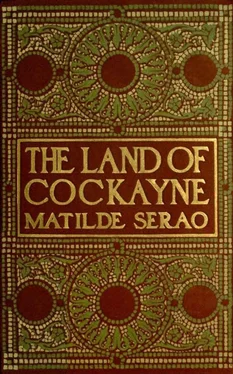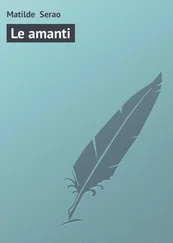Matilde Serao - The Land of Cockayne
Здесь есть возможность читать онлайн «Matilde Serao - The Land of Cockayne» — ознакомительный отрывок электронной книги совершенно бесплатно, а после прочтения отрывка купить полную версию. В некоторых случаях можно слушать аудио, скачать через торрент в формате fb2 и присутствует краткое содержание. Жанр: unrecognised, на английском языке. Описание произведения, (предисловие) а так же отзывы посетителей доступны на портале библиотеки ЛибКат.
- Название:The Land of Cockayne
- Автор:
- Жанр:
- Год:неизвестен
- ISBN:нет данных
- Рейтинг книги:3 / 5. Голосов: 1
-
Избранное:Добавить в избранное
- Отзывы:
-
Ваша оценка:
- 60
- 1
- 2
- 3
- 4
- 5
The Land of Cockayne: краткое содержание, описание и аннотация
Предлагаем к чтению аннотацию, описание, краткое содержание или предисловие (зависит от того, что написал сам автор книги «The Land of Cockayne»). Если вы не нашли необходимую информацию о книге — напишите в комментариях, мы постараемся отыскать её.
The Land of Cockayne — читать онлайн ознакомительный отрывок
Ниже представлен текст книги, разбитый по страницам. Система сохранения места последней прочитанной страницы, позволяет с удобством читать онлайн бесплатно книгу «The Land of Cockayne», без необходимости каждый раз заново искать на чём Вы остановились. Поставьте закладку, и сможете в любой момент перейти на страницу, на которой закончили чтение.
Интервал:
Закладка:
'Who is that starving fellow, my dear?'
'Who knows?' said the other impatiently.
'Cesarino certainly does; he is handing him glasses of wine.'
'Cesare gathers these wretched people up by the cart-load,' said she, shaking with rage.
But suddenly a subdued whispered word ran from man to man, woman to woman—a syllable breathed rather than pronounced. Who first said this hissing word? Who was it that recognised him, and softly breathed it in his neighbour's ear? Who had let it out, the unknown secret? No one knows! But in a second, quick as a flash of gunpowder, all knew and repeated the mystic word throughout the crimson room. It came back on itself, its letters making a magic circle that went round, and everyone with it. When they all knew who the man was, they were seized with stupefaction; the lamps seemed to be suddenly lowered, their lively faces got pale, even the covers of the furniture lost colour; there was a deep silence, where the magic word still lingered feebly: 'The medium—the medium.'
Luisella herself, the intrepid, grew pale; her hands trembled as they grasped her fan. The medium had given up feeding; now he was resting quietly, casting his vague, uncertain glances about, not knowing what to do with his lean yellow hands. A little blood had risen in his pale cheeks, under the black beard; but it was in streaks, a sickly colour, the effect of fever. Still, ugly, dirty, miserable as he was, all attention was concentrated on him—inquisitive, wheedling, obsequious glances were directed on him, in which was combined fantastic fear, especially on the women's part. For even the women, in a nervous tremor, said to one another, 'It is the medium.' A circle gradually surrounded him, getting nearer, as if by a strong natural attraction—rather anxious faces, where one could notice the vivid working of Southern imaginations, in this land of dreams and fantasies. Shy folk were now joining the bolder ones who had come near at first, overcome, dreaming of the train of ministering spirits, good and bad, who are ever warring around the medium's soul. Don Gennaro Parascandolo, one of the first to come up, found himself so hemmed in that he turned to Cesare Fragalà, and said, smiling rather sceptically:
'Cesarino, introduce me to this gentleman.'
Cesare was much embarrassed, but, seeing no way out of it, he caught at this request, and said quickly:
'Don Gennaro Parascandolo, Pasqualino De Feo, a friend of mine.'
The medium smiled vaguely and held out his hand, which Don Gennaro found icy cold, though damp with perspiration, one of those repulsive hands that make one shudder. But not a word was said. The women standing outside the circle, not daring to come near, asked each other, troubled by a deep longing:
'What does he say?'
'He says nothing,' Donna Carmela Naddeo answered; she was nearest, and never took her eye off him.
The women bit their lips, the men's presence intimidated them; too bashful to go near, they shivered with impatience to hear the fateful words of the man living in constant communication with the world of spirits, who heard all the hidden truths of life from the good spirits, who was told by them every week five, or at least three, of the lottery numbers.
What was he saying? Nothing. For long hours these people stand concentrated, lost, perhaps, in a great interior conflict, listening to the high voices that speak to them. Now and then, torn from their visions, they pronounce some fateful phrase that contains the secret, wrapped up in mysterious words, often without form, that those of strong faith and hope can miraculously understand. All, men and women, overcome by a great dream, suddenly shaken out of daily realities into the ardent, burning region of visions, forgetting the present moment, listened to the medium as if to a superhuman voice.
Don Gennaro Parascandolo certainly kept up a well-informed traveller's smile; he had a large, secure fortune, but in the bottom of his heart the old Parthenope instinct, for big gains, illicit, if not guilty, costing no trouble, unforeseen, owed to chance, combination, or getting the better of Government, all came so naturally to a man who knew the secrets of hidden things. Certainly all these, Fragalàs, Antonaccis, Naddeos, Durantes, were accustomed to sell stale sweets, rough earthenware, moth-eaten cloth, and stinking cod, in dark shops, in cold storehouses in Via Tribunali, Mercanti, Petra del Pesce, Marina; they were used to all the dulness, vulgarity and meanness of commerce, where year after year, by putting one penny on another, after two or three generations, a fortune came; they all knew the value of money, of work, of economy, of industry: but what did that matter? To be able, by means of a mysterious phrase that only cost the trouble of picking up, of interpreting, to gain big sums with a small stake, get in one day the gains of twenty years' trade in dry cod, or forty years' trade in sugar and sandy coffee, was so delightful a gift, so dazzling a vision, to middle-class ideas!
Certainly all these clerks and tradesmen looked forward to a modest future. They had lived on nothing; they were living on very little; they wanted to have a little more, only that: humble in their wishes, even. But the sight of the medium, a shabby fellow, yet so powerful, who spoke every night with supernal and infernal spirits, suddenly threw them into a fantastic world, where poor folk get miraculously rich, where they, obscure working people, might become gentlemen. Ah! Don Domenico Mayer, the nephew, son, brother, and uncle of clerks, had faith only in sacred bureaucracy—a cold career of silent suffering. Still, buttoned up in his overcoat, he left his family in the corner and joined the group round Pasqualino De Feo, the medium, and his anxious, severe expression wavered as he, too, waited for the phrase that was to draw him away in a day from the sepulchral atmosphere of the Finance Department. But the women's imaginations were the most feverish. Certainly at least ten of them, by birth, marriage, by their own efforts, or by their relations or husbands, were rich; their fortunes were easy, their children's future secure. Ten at least enjoyed the middle-class luxury of brocaded sofas, jewels, any amount of linen. All the others, by their modesty, good sense, and economy, by their own virtues or their parents', had everything that was necessary; but a lively passion for dreams had awakened and burned in them. Their souls were filled with visions of comfort, riches, luxury; they flew through the regions of desire with womanly tremblings, with the force and intensity the quietest women put into these sudden follies. An overwhelming wish to know the great secret seized them; crumbling pyramids of gold and jewels lit flames in their eyes. Even the old Marchioness of Castelforte, so crooked, such a ruin of a woman, a solitary remnant, the only one of her family, with no relations or heirs, seventy years old, and nothing but the tomb in front of her, got up, carrying her velvet bag, and set her coquettish profile between two men's shoulders. Even Donna Carmela Naddeo strained her ears, trembling with curiosity, rich and lucky as she was, whispering to herself: 'If he tells me the numbers, I will buy a diamond star like Luisella's.'
The medium still kept silence, so that Don Gennaro Parascandolo, feeling the impatience of the whole room behind him, risked a question:
'Have you enjoyed the party, Don Pasqualino?'
He opened his mouth; at last a low, feverish voice came from the thin blue lips.
'Yes,' he said; 'it is a fine christening. The baptism of Christ on the Jordan was fine, too.'
At once there was an agitation in the room, commenting on the phrase, trying to explain it. They formed into circles and groups, the women discussing it among themselves, whilst the number thirty-three, the Redeemer's number, ran from mouth to mouth.
Читать дальшеИнтервал:
Закладка:
Похожие книги на «The Land of Cockayne»
Представляем Вашему вниманию похожие книги на «The Land of Cockayne» списком для выбора. Мы отобрали схожую по названию и смыслу литературу в надежде предоставить читателям больше вариантов отыскать новые, интересные, ещё непрочитанные произведения.
Обсуждение, отзывы о книге «The Land of Cockayne» и просто собственные мнения читателей. Оставьте ваши комментарии, напишите, что Вы думаете о произведении, его смысле или главных героях. Укажите что конкретно понравилось, а что нет, и почему Вы так считаете.












